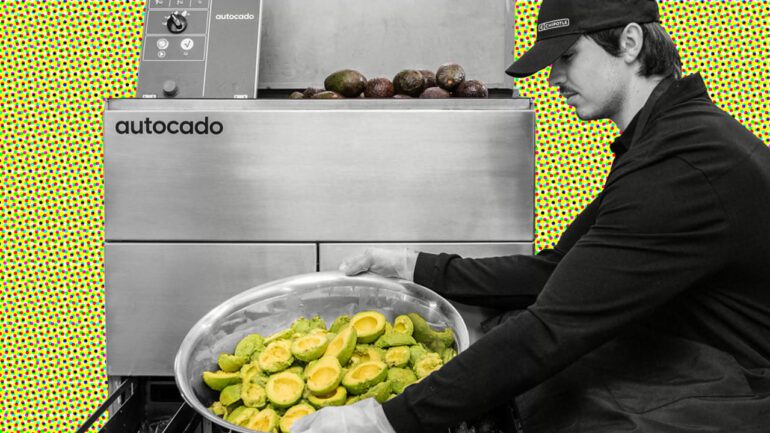TL;DR:
- Chipotle introduced the Autocado, a collaborative robot developed with Vebu to streamline guacamole preparation.
- The Autocado can hold up to 25 lbs of avocados and autonomously cuts, cores, and peels them.
- It has the potential to reduce guacamole preparation time by up to 50%, allowing more focus on customer service.
- The device is currently undergoing testing and could be implemented in Chipotle’s restaurants worldwide.
- Chipotle also embraces machine learning for kitchen management to optimize ingredient freshness and reduce waste.
- The restaurant industry is embracing AI and robots, as seen with drive-thru bots in other fast-food chains.
Main AI News:
In the ever-evolving landscape of the restaurant industry, Chipotle has once again taken the lead in innovation with the introduction of its cutting-edge Autocado. This state-of-the-art guacamole-making robot, developed in partnership with restaurant technology solution provider Vebu, promises to transform the avocado preparation process and revolutionize the way Chipotle’s renowned guacamole is crafted.
Handling over 100 million pounds of avocados each year is no easy task, and the Autocado rises to the challenge with remarkable efficiency. Capable of holding up to 25 lbs of avocados at a time, the Autocado swiftly orients the avocados vertically and expertly transfers them to the processing device, where they are precisely sliced in half. This robotic marvel then autonomously removes the core and skins, skillfully collecting the fruit in a gleaming stainless-steel bowl. The final touch rests in the hands of Chipotle’s skilled employees, who can quickly add the perfect blend of ingredients and hand-mash the mixture to create the delightful guacamole loved by millions.
The benefits of the Autocado are truly remarkable. Presently, the guacamole-making process can consume up to 50 minutes, largely due to the time-intensive tasks of cutting, coring, and scooping avocados. However, Autocado promises to streamline this laborious segment, potentially reducing the prep time by a staggering 50 percent. This efficiency boosts not only ensures a consistent and delightful guacamole experience for customers but also grants Chipotle employees more time to focus on providing exceptional service to their valued guests.
Curt Garner, Chipotle’s Chief Customer and Technology Officer, emphasizes the device’s dedication to maintaining the authentic guacamole experience Chipotle is known for, tailored to exacting standards. The Autocado has been meticulously designed with the goal of alleviating the pain points faced by restaurant employees, demonstrating Chipotle’s unwavering commitment to enhancing both the customer and employee experience.
The Autocado prototype is currently undergoing rigorous testing at the esteemed Chipotle Cultivate Center in Irvine, California. Vebu, the mastermind behind this culinary automation, is diligently working to further enhance Autocado’s processing speeds and unlock the full potential of AI and machine learning to optimize its efficiency.
If the trial phase proves successful, Autocado’s realm of influence will extend far beyond the confines of the Cultivate Center. Chipotle envisions implementing this revolutionary robot in each of its over 3,200 restaurants across the United States, Canada, the United Kingdom, France, and Germany. This bold move represents a significant stride towards embracing automation, propelling Chipotle to the forefront of cutting-edge technology in the restaurant industry.
Indeed, Chipotle’s Autocado is just one of the many technological strides the restaurant giant is taking to reshape the industry’s landscape. Embracing the power of machine learning, Chipotle is also working on implementing a new kitchen management system. This innovative system harnesses real-time data from kitchens and food operations simulations to develop algorithms that optimize ingredient freshness and minimize food waste. The result? Accurate predictions of demand at any given time, driving down costs and reducing waste, while maintaining a commitment to quality.
Chipotle’s commitment to innovation is not an isolated case within the restaurant industry. Industry players are racing to embrace artificial intelligence, machine learning, and robotics to elevate their services and improve the customer experience. Fast-food titans Hardee’s and Carl’s Jr. have ventured into the realm of drive-thru robotics. They have recently announced the deployment of AI voice bots at many locations nationwide, revolutionizing the drive-thru ordering experience.
Meanwhile, Wendy’s, another prominent player in the fast-food arena, has launched Wendy’s FreshAI, a cutting-edge generative AI-powered drive-thru experience in Columbus, Ohio. Powered by Google’s foundational large language models, this innovative chatbot enhances the ordering process, engaging customers in seamless conversations, processing custom requests, and providing prompt responses to frequently asked questions. The marriage of AI and Wendy’s well-established business rules and restaurant hardware elevates the drive-thru experience to a new level of convenience and consistency.
Conclusion:
Chipotle’s Autocado represents a significant advancement in the restaurant market, showcasing the potential of robotics and AI to enhance operational efficiency and customer experiences. By automating labor-intensive tasks and optimizing kitchen management, Chipotle sets a precedent for other players in the market to embrace innovative technologies and reshape their operations. As the industry moves towards automation, those who adopt these advancements can gain a competitive edge in meeting customer demands while maintaining quality standards.

